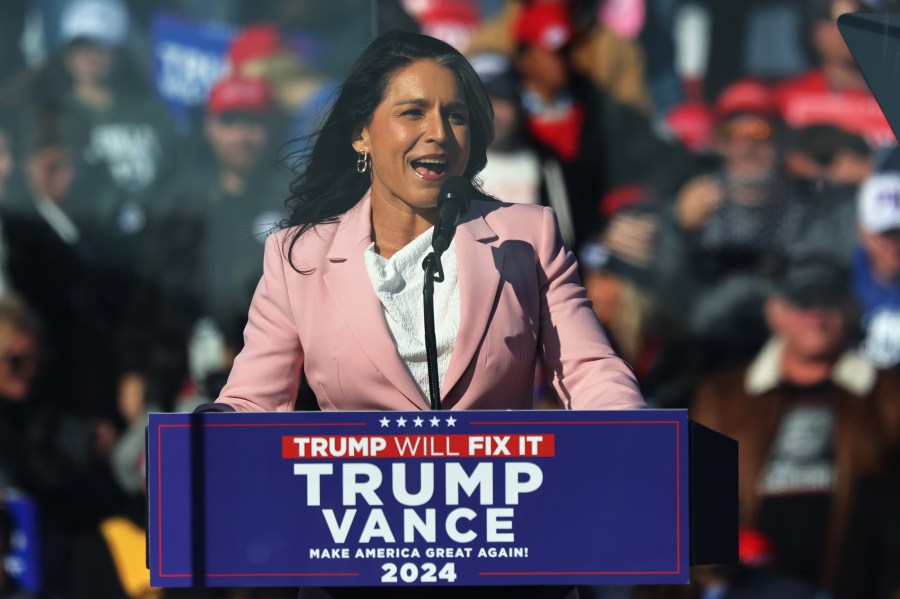(NewsNation) — Several of President Donald Trump’s nominees for Cabinet positions, including Robert F. Kennedy Jr., Tulsi Gabbard and Kash Patel, are still awaiting Senate confirmation hearings as part of a lengthy process that ensures a system of checks and balances.
The Senate is set to vote to limit debate on Gabbard’s nomination as Trump’s secretary of national intelligence on Monday, NewsNation partner The Hill has confirmed. According to the Republican Majority Whip’s Office, the GOP can afford three defections on Gabbard assuming that all Democrats vote no and can limit debate to 30 hours on Gabbard’s nomination.
Gabbard, along with Kennedy (secretary of Health and Human Services), Howard Lutnick (secretary of Commerce), Brooke Rollins (secretary of Agriculture) and others, are currently listed on the executive calendar.
Musk calls to impeach ‘corrupt’ judge after DOGE access blocked
Cabinet nominees go through the confirmation process, of which the hearings are the most public aspect as they are typically televised. However, the entire confirmation process is part of a vetting procedure by the Senate that is outlined in Article 2 of the U.S. Constitution as part of the “advice and consent” clause.
The confirmation process includes the following steps:
Meeting with senators/ethics review
Cabinet nominees visit Capitol Hill even before their confirmation hearings begin, which allows U.S. Senators to meet the nominee in a more informal setting to show them support or to press them on potential policy disputes that may arise later, The New York Times reported.
Early on, nominees are also vetted by the Office of Government Ethics to identify and resolve potential conflicts of interest. The FBI also determines whether the nominee is trustworthy and eligible for the role for which they have been nominated, according to the Campaign Legal Center,
Pete Hegseth, military analyst at Twenty-First Century Fox Inc. and US secretary of defense nominee for US President-elect Donald Trump, during a Senate Armed Services Committee confirmation hearing in Washington, DC, US, on Tuesday, Jan. 14, 2025. (Photographer: Al Drago/Bloomberg via Getty Images)
As part of the ethics review, nominees are required to submit documents that outline their education and qualifications for the Cabinet position. The documentation also provides an insight into whether the nominee has used drugs or has a police record, The New York Times reported. The FBI uses submitted paperwork to conduct a background check, which allows senators to evaluate the nominee more thoroughly.
“That ethics agreement is often one of the most complex and important parts of the entire nominee screening process,” Norman Eisen, who was an ethics official in the Obama administration, told The New York Times. “That is the place where, for example, former employers or clients or current financial interests are identified, and arrangements are made to recuse the nominee from working on relevant particular matters or other issues.”
Senate staff and confirmation hearings
Before appearing before the full Senate, nominees often testify before members of a committee on which the nominee may serve depending on their Cabinet position. As part of the committee review, nominees may be asked about their experience, their stand on policy and how they intend to fulfill the role for which they have been nominated, the Campaign Legal Center stated.
1 in 5 taxpayers are missing out on thousands with this tax credit
After appearing before committee members, nominees are voted on by the committee, and if approved, they move on to appear before the full Senate. This sets the stage for the full confirmation vote, during which senators can debate a nominee on the Senate floor before the final vote on the nominee is taken.
Robert F. Kennedy, Jr., President Trump’s nominee to serve as Secretary of Health and Human Services testifies during a Senate Committee on Health, Education, Labor and Pensions hearing for his pending confirmation on Capitol Hill, Thursday, Jan. 30, 2025, in Washington. (AP Photo/Rod Lamkey, Jr.)
During the debate portion of the confirmation process, senators can express any concerns they may have. The debate continues until a majority of senators vote to invoke a “cloture,” which limits further debate.
Both Kennedy and Gabbard have faced criticism due to their past stances on issues such as the pardoning of Edward Snowden, who leaked classified government surveillance (Gabbard), and their controversial stance on vaccine skepticism (Kennedy).
Gabbard, Kennedy, Hegseth and Patel, the last Trump’s nominee to oversee the FBI, were expected to face the stiffest opposition for confirmation, The Associated Press reported.
A majority of senators must vote to approve the nominee for them to be confirmed. If the case of a tie, Vice President JD Vance casts the tiebreaking vote, which was the case for Pete Hegseth, who was confirmed as Trump’s secretary of the Department of Defense.
Once confirmed, the nominee can officially begin work in their capacity. If the nominee is not confirmed by the Senate, the president must nominate a new candidate, and the entire process begins again.
